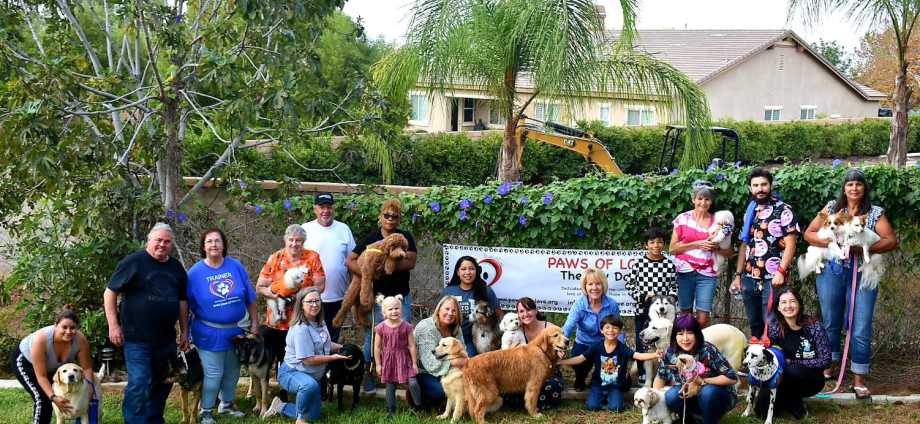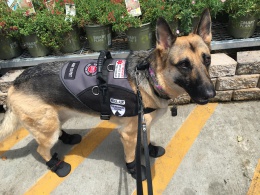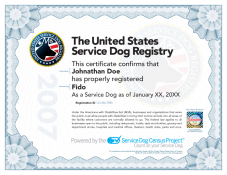Service Dogs
Service animals are animals that are individually trained to perform tasks for people with disabilities such as pulling wheelchairs, alerting and protecting a person who is having a seizure, or performing other special tasks. Service animals are working animals, not pets.
Under the Americans with Disabilities Act (ADA), businesses and organizations that serve the public must allow people with disabilities to bring their service animals into all areas of the facility
where customers are normally allowed to go. This federal law applies to all businesses open to the public, including restaurants, hotels, taxis and shuttles, grocery and department stores, hospitals
and medical offices, theaters, health clubs, parks, and zoos.
We offer individuals with a qualified disability the opportunity to learn how to train their own dog to become a Service dog for their use.
- We do not provide fully trained service dogs
- We will assist in the selection of a appropriate puppy/dog
- We will provide training services and equipment necessary to socialize and train your dog to be appropriate in public as well as perform the tasks necessary to assist you with your needs.
It typically takes 18-24 months to fully train a service dog from a 4 month old puppy. Rescued dogs who are between 1 & 3 years may be fully trained significantly faster.
While individuals are permitted to train their own service dog, that doesn't necessarily mean they are capable. If you do not already have experience doing advanced training with service dogs, then you may not have sufficient experience to train a service dog on your own.
To insure success you may need to hire a Certified Service Dog Trainer.
We can assist with all facets of the training process
It all begins with a FREE evaluation of your dog
During the evaluation we will give you feedback on your dogs aptitude for service, training needs, (based on your disability and needs) and come up with a plan to help you train your dog to become a Service Dog.
We will be honest, with more than 20 years experience training and placing service dogs with disabled individuals, if we feel your dog is not appropriate then we will not offer to assist you train that dog. If you choose we can assist you to find a dog that would be appropriate.
If you don't yet have a dog, we will discuss your needs and options for obtaining a dog and come up with a training plan. The cost for Service Dog Training varies depending on your dogs training needs. While some dogs require complete training from basic obedience to task work, others only need help with task work, socialization or public outings.
For more information or to set up an appointment to have your dog evaluated, please complete our Contact Us form.
A Word About "Service Dog Certification/Registration"
First you should know that there is NO legal requirement for a Service Animal to be Certified/Registered etc… The ADA law does not require the dog to wear a vest or have an ID card. Some states provide for registration as a means of special identification.
Many legitimate Service Dog organizations “certify” service dogs under their programs, they are simply endorsing that the dog has received training that is of the quality they require and that the dog is appropriate for public access.
Certification does not mean an individual dog is a service dog. Neither does registration or an official looking ID. There are several businesses selling fake certification, registration and IDs over the Internet. All one needs to do to get these products is pay a fee. Their dog is never tested and their disability is never verified. All the product really means is that the person was willing to pay money to get it.
Those who purchase fake certification do so because they, or those they encounter, doubt their dog's real status and it is easier to purchase a fake document than to actually get their dog properly trained and evaluated by an expert.
There are criminal penalties for falsely claiming a pet as a service animal. These penalties can range from a small fine, to one over $1,000 or a few days in jail up to a year in jail, depending on how the offense is committed and where. In some cases, the dog is confiscated and the owner may have a lengthy court battle to get the dog back.
Additionally, that untrained dog could cause a disabled person to be injured by distracting their trained legitimate Service Dog!
So if you're thinking of passing your pet off as a service dog,
ask yourself this question; Is it's really worth it?
Service Dog Law & Public Access Information
U.S. Department of Justice
Civil Rights Division
Disability Rights Section
Service Animals
The Department of Justice published revised final regulations implementing the Americans with Disabilities Act (ADA) for title II (State and local government services) and title III (public
accommodations and commercial facilities) on September 15, 2010, in the Federal Register. These requirements, or rules, clarify and refine issues that have arisen over the past 20 years and contain
new, and updated, requirements, including the 2010 Standards for Accessible Design (2010 Standards).
Overview
This publication provides guidance on the term “service animal” and the service animal provisions in the Department’s new regulations.
- Beginning on March 15, 2011, only dogs are recognized as service animals under titles II and III of the ADA.
- A service animal is a dog that is individually trained to do work or perform tasks for a person with a disability.
- Generally, title II and title III entities must permit service animals to accompany people with disabilities in all areas where members of the public are allowed to go.
How “Service Animal” Is Defined
Service animals are defined as dogs that are individually trained to do work or perform tasks for people with disabilities. Examples of such work or tasks include guiding people who are blind,
alerting people who are deaf, pulling a wheelchair, alerting and protecting a person who is having a seizure, reminding a person with mental illness to take prescribed medications, calming a person
with Post Traumatic Stress Disorder (PTSD) during an anxiety attack, or performing other duties. Service animals are working animals, not pets. The work or task a dog has been trained to provide must
be directly related to the person’s disability. Dogs whose sole function is to provide comfort or emotional support do not qualify as service animals under the ADA.
This definition does not affect or limit the broader definition of “assistance animal” under the Fair Housing Act or the broader definition of “service animal” under the Air Carrier Access Act. Some State and local laws also define service animal more broadly than the ADA does. Information about such laws can be obtained from the State attorney general’s office.
Where Service Animals Are Allowed
Under the ADA, State and local governments, businesses, and nonprofit organizations that serve the public generally must allow service animals to accompany people with disabilities in all areas of
the facility where the public is normally allowed to go. For example, in a hospital it would be inappropriate to exclude a service animal from areas such as patient rooms, clinics, cafeterias,
or examination rooms. However, it may be appropriate to exclude a service animal from operating rooms or burn units where the animal’s presence may compromise a sterile environment.
Service Animals Must Be Under Control
Under the ADA, service animals must be harnessed, leashed, or tethered, unless these devices interfere with the service animal’s work or the individual’s disability prevents using these devices.
In that case, the individual must maintain control of the animal through voice, signal, or other effective controls.
Inquiries, Exclusions, Charges, and Other Specific Rules Related to Service Animals
- When it is not obvious what service an animal provides, only limited inquiries are allowed. Staff may ask two questions: (1) is the dog a service animal required because of a disability, and (2) what work or task has the dog been trained to perform. Staff cannot ask about the person’s disability, require medical documentation, require a special identification card or training documentation for the dog, or ask that the dog demonstrate its ability to perform the work or task.
- Allergies and fear of dogs are not valid reasons for denying access or refusing service to people using service animals. When a person who is allergic to dog dander and a person who uses a service animal must spend time in the same room or facility, for example, in a school classroom or at a homeless shelter, they both should be accommodated by assigning them, if possible, to different locations within the room or different rooms in the facility.
- A person with a disability cannot be asked to remove his service animal from the premises unless: (1) the dog is out of control and the handler does not take effective action to control it or (2) the dog is not housebroken. When there is a legitimate reason to ask that a service animal be removed, staff must offer the person with the disability the opportunity to obtain goods or services without the animal’s presence.
- Establishments that sell or prepare food must allow service animals in public areas even if state or local health codes prohibit animals on the premises.
- People with disabilities who use service animals cannot be isolated from other patrons, treated less favorably than other patrons, or charged fees that are not charged to other patrons without animals. In addition, if a business requires a deposit or fee to be paid by patrons with pets, it must waive the charge for service animals.
- If a business such as a hotel normally charges guests for damage that they cause, a customer with a disability may also be charged for damage caused by himself or his service animal.
- Staff are not required to provide care or food for a service animal.
Miniature Horses
In addition to the provisions about service dogs, the Department’s revised ADA regulations have a new, separate provision about miniature horses that have been individually trained to do work or
perform tasks for people with disabilities. (Miniature horses generally range in height from 24 inches to 34 inches measured to the shoulders and generally weigh between 70 and 100 pounds.) Entities
covered by the ADA must modify their policies to permit miniature horses where reasonable. The regulations set out four assessment factors to assist entities in determining whether miniature horses
can be accommodated in their facility. The assessment factors are (1) whether the miniature horse is housebroken; (2) whether the miniature horse is under the owner’s control; (3) whether the
facility can accommodate the miniature horse’s type, size, and weight; and (4) whether the miniature horse’s presence will not compromise legitimate safety requirements necessary for safe operation
of the facility.
For more information about the ADA, please visit our website or call our toll-free number.
ADA Website: www.ADA.gov
To receive e-mail notifications when new ADA information is available, visit the ADA Website’s home page and click the link near the top of the middle column.
ADA Information Line 800-514-0301 (Voice) and 800-514-0383 (TTY)
24 hours a day to order publications by mail.
M-W, F 9:30 a.m. – 5:30 p.m., Th 12:30 p.m. – 5:30 p.m. (Eastern Time) to speak with an ADA Specialist. All calls are confidential. For persons with disabilities, this publication is available in
alternate formats.
Duplication of this document is encouraged- July 2011







